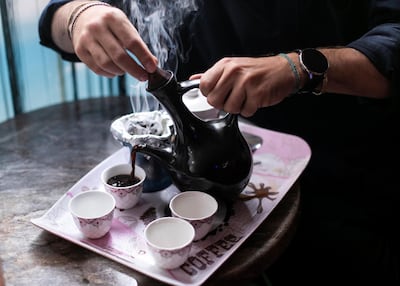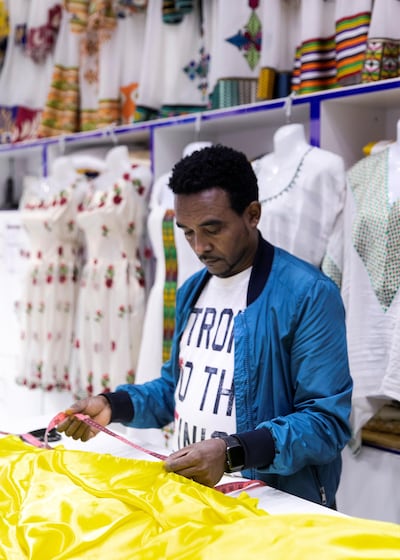Taking in a coffee ceremony at an Ethiopian cafe is an experience. A woman arrives with a straw tray full of freshly roasted coffee beans, placing them directly under your nose so you can inhale the strong aroma. Once you nod in approval, feeling suitably heady from the fumes, she disappears, only to return a few minutes later with a clay pot full of brewed coffee. She pours it delicately into small, white, traditional china cups.
Read More
Ethiopian food deconstructed: a symbol of love
Urban treasures: four Abu Dhabi hidden gems that deserve special status
'I thought I was social, until I arrived in the UAE': Five things you learn living in Abu Dhabi
What happens next could be totally fine or weird, depending on your culture and point of view – she sits down next to you to talk. As I am from Eritrea, which borders Ethiopia, I find it normal. We chat away and sip our coffee, allowing the strong dose of caffeine to perk us up.
The lady's name is Arhet and we are in Freiwot Coffee Shop. This is the first stop on the self-guided, online African Scene Tour of Dubai found on the Street Life app. Available to download for free, the app allows you to enjoy a variety of tours that take in some of the cultural and historical sites in Dubai and Sharjah.
The coffee shop is in Frij Al Murar district of Dubai, in the back lanes of Deira. The neighbourhood has long been viewed as the emirate's African enclave, with shops and stalls belonging mostly to merchants from Ethiopia. The area is made up of tiny streets only wide enough to allow the odd car to roll through. These are filled with small businesses – from barbershops to restaurants – all featuring the tricoloured flag (green, yellow and red) belonging to one of the world's oldest civilisations.
Music wafts through the streets alongside the coffee smells, and the pulsating Amharic pop belonging to one of Ethiopia's biggest stars, Teddy Afro, plays in Freiwot. Arhet digs the tune. She taps her foot along to the beat, as she tells me how much she enjoys the whole Dubai experience. "I have been here for just over a year and this area just feels like home in Addis Ababa," she says. "This cafe and the people who come here are all the same. I feel comfortable."
The fact I also feel comfortable chatting with Arhet is down to her skill in making customers feel right at home. "Many people who come to the coffee shop, men and women, are lonely," she says. "They miss their friends and family and my job is to sit with them and let them talk. The rules are that I don't judge and don't share secrets. What we talk about here, stays here."
A few moments later, the curator of the walking tour, Dina Yassin, walks into the cafe. You can't miss the Eritrean fashion designer whose behind the label Efro & Co, with her brightly coloured and impossibly cool urban clothing, which includes a yellow embroidered jacket, jeans and eye-popping sneakers, which contrast with the dimly lit, basic decor of the venue. Apologising for being late, Yassin says she is pleased I have already enjoyed the Ethiopian coffee experience, so we immediately head out and she accompanies me along the rest of the tour.
It takes five hours to complete the tour, and it distils the knowledge and experiences Yassin has accumulated during her many years spent living within one of the first East African communities in the country. As we walk past tailors and specialised grocery stores, she describes her experience of growing up in a pan-African household after arriving in Abu Dhabi in 1978 at the age of 2. "My father was an economic adviser for what was called the Abu Dhabi Fund for Development," she explains. "He travelled a lot around Africa and he made a lot of friends who came to our house.
One of our neighbours was Tanzanian, so there was this great vibe and African community – of Eritreans, Ethiopians and Sudanese – that I grew up with in both Abu Dhabi and Dubai."
It was only about 15 years ago that Deira started being viewed as a hub for the African diaspora. It began mostly with Somali traders working in various businesses, from import and export to women’s fashion, as well as Ethiopian and Eritrean merchants.
The African Tour mostly focuses on the last two groups, Yassin explains, as these represent the majority of the small businesses in this area today. "The Sudanese have been [in Dubai] longer, but they mostly worked in the government sector."
The businesses may be small, but that doesn't mean financial success can't be found among Deira's gritty backstreets. I only need a few minutes in Mulugeta Belay Fashion and Ladies Tailoring – our next stop on the tour – to know business is booming. The shop specialises in traditional Ethiopian and Eritrean garments, which are renowned for their soft cotton and hand embroidery. The shop has been doing well for the best part of a decade, and prices for hand-stitched dresses range from about Dh200 to Dh3,000.
"It started in Eritrea, in our capital, Asmara," the owner, Mulugeta Belay, says. "But I wanted to move to Dubai to allow myself a more international base. Deira is an excellent location because a lot of African tourists come here and they make orders for family weddings in Europe or America."
After sampling the visual splendour of East African clothing, Yassin and I follow the smell of fragrant spices. It's a good thing that Red City's stock is positively pungent or we would have totally missed the place. Located on a side street, the hole-in-the-wall shop is sparsely furnished but full of shelves featuring all kinds of berbere – a spice blend integral to Ethiopian and Eritrean curries – as well as traditional clay pots and cutlery.
Ethiopian co-manager Johannes Saatiskat grabs one of the plastic bags full of the bright red seasoning – which usually consists of chilli peppers, garlic, ginger and fenugreek, to name a few – and explains "berbere is like water for many families here. Any Ethiopian or Eritrean family who lives in the UAE needs berbere or they cannot eat".
Mattaues Mulugetta, who also works there, is more circumspect about the importance of the spice to his community. "It is a very important spice and something we have eaten since we were children," the Ethiopian says. "Our business does well here because of the location in Deira and the fact we are close to the airport. Our spices come fresh from Ethiopia a few times a week."
It's easy to recognise why these businesses in Frij Al Murar do well. In the few hours I spend chatting with shopkeepers, none of them take any digs at their competitors. There is a community element here that is endearing, and an overall feeling that a successful business benefits everyone. That's why it doesn't surprise me when Mulugetta kindly volunteers to chaperone us on the five-minute walk to a nearby business and another stop on the tour, the Jade Salon.
Ethiopian male models feature in posters that adorn the bright white walls, as men sit in front of large, intricately designed mirrors. The manager, Biniyam Worku, has a laid-back charm.
"Whenever there is an Ethiopian neighbourhood there needs to be barbershops," he says. "We have been here for five years and the community is getting bigger and they need someone to look after their hair."
The thing with Ethiopian and Eritrean locks, Worku explains, is they are too varied for non-specialist barbers. "Some of the hair feels like tough wool and others are close to dreadlocks," he says. "You can't take this to anyone [else]. Many people who come here work in hotels so they need to look good."
As with barbershops anywhere in the world, the cutting room floor of Jade Salon is scattered with the secrets of its patrons. "We men talk, too," Worku says with a smile. "We talk about our homes in Ethiopia and our dream romances."
It is conversation that sustains this neighbourhood, after all. Whether it is in the company of Arhet at the coffee shop or spending your time haggling with the tailor over the prices of his latest designs, Frij Al Murar is sustained by memories as much as money.
This is something I reflect on in the last stop of the tour, the Zagol Restaurant. The Ethiopian eatery, down the road in Karama, is a hive of activity. I enjoy the atmosphere as we tear into some injera (spongy bread made using teff flour) and scoop up a whole range of berbere-infused curries.
"The point of the tour is also to show people a different kind of vibe," Yassin says. "It's about meeting people, exchanging stories and philosophies. Some people walk away having enjoyed the atmosphere, while others walk away learning something new about their lives in the UAE."
I walked away having done both and, if I've learnt anything, it's that there's always something new to experience in Frij Al Murar.
Other Street Life tours to try
Street Life is an app that allows you to go on a range self-guided walking tours across Dubai and Sharjah. Each trail has been chosen for its cultural significance and many are virtually hosted and curated by a seasoned UAE resident with specialised knowledge of an industry (a fashion designer or a DJ, for example). There are more than 20 available, but here are three free tours visitors must try.
Street Photography
Check out the best and most secret spots of Old Dubai to take the perfect snap. This tour has been curated by Libyan-Irish photographer Jalal Abuthina, who is the artist and author of the book Inside Dubai.
Duration: 6 hours
Rockers Tour
The best live music spots, vinyl and instrument stores around Dubai have been discovered for this tour by local rockers Carl and Reda Mafia.
Duration: 4 hours
Al Qasba Tour
Explore one of Sharjah's best-loved destinations, which is home to a range of restaurants and art galleries. This comprehensive tour, curated by the Sharjah Investment and Development Authority, takes you deep into one of the UAE's underrated cultural hubs.
Duration: 3 hours
For more information, visit www.streetlife.app
















